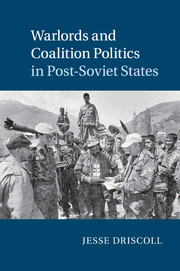Book contents
- Frontmatter
- Epigraph
- Contents
- Acknowledgments
- 1 Revisionist History
- 2 Predator Collusion: A High-Stakes Game
- 3 Kto Kogo?
- 4 Warlord Coalitions and Militia Politics
- 5 Coup-Proofing
- 6 Implications
- Appendix A Case Selection and External Validity
- Appendix B Mathematical Proofs
- Appendix C Ninety-Seven Anonymous Warlords
- References
- Index
- Other Books in the Series
2 - Predator Collusion: A High-Stakes Game
Published online by Cambridge University Press: 05 July 2015
- Frontmatter
- Epigraph
- Contents
- Acknowledgments
- 1 Revisionist History
- 2 Predator Collusion: A High-Stakes Game
- 3 Kto Kogo?
- 4 Warlord Coalitions and Militia Politics
- 5 Coup-Proofing
- 6 Implications
- Appendix A Case Selection and External Validity
- Appendix B Mathematical Proofs
- Appendix C Ninety-Seven Anonymous Warlords
- References
- Index
- Other Books in the Series
Summary
A persuasive account of state recovery must answer two questions. First: How did civilian executives become strong once formal institutions collapsed? The answer, as already forecast in the first chapter, is that they were figurehead placeholders for coalitions of warlords who “ran the streets” out of sight. But because this arrangement ultimately benefitted the president at the expense of the warlords who installed him, it is reasonable to ask a second question: Why did warlords agree to install a president if they knew that a possible result was that he would use divide-and-rule tactics to cut them out of the spoils? The answer is that although some high-profile warlords were jailed or killed in the consolidation lottery, others slid out of view, reinventing themselves as state agents. A few became quite wealthy.
In this simplified account, state-building is a constantly renewing process of contracting and bargaining between violence entrepreneurs. Warlords are locked in competition, and their rivalry can easily turn violent. This violence can end only with military victory or through a process of coalition building. Though they have the option of working together, cooperation is risky. If a group of warlords can assemble a coalition with sufficient military power to seize the capital city and achieve international recognition, it can install a civilian regime. This civilian regime will gain access to foreign aid, military assistance, and low-interest capital investment. The new regime will become the warlords' hostage, and will immediately transfer most of these new rents to them to stay in power. If the gains associated with seizing the capital city and extorting the rents of sovereignty are greater than the expected utility of outright war, all warlords may rationally abjure violence.
This chapter presents an account of civil war settlement under conditions of state failure. Though it is presented in the form of a two-stage, n-player coalition game, one does not have to be a student of game theory to understand the argument in this chapter (proofs and formal propositions can be found in Appendix B).
- Type
- Chapter
- Information
- Warlords and Coalition Politics in Post-Soviet States , pp. 30 - 45Publisher: Cambridge University PressPrint publication year: 2015

